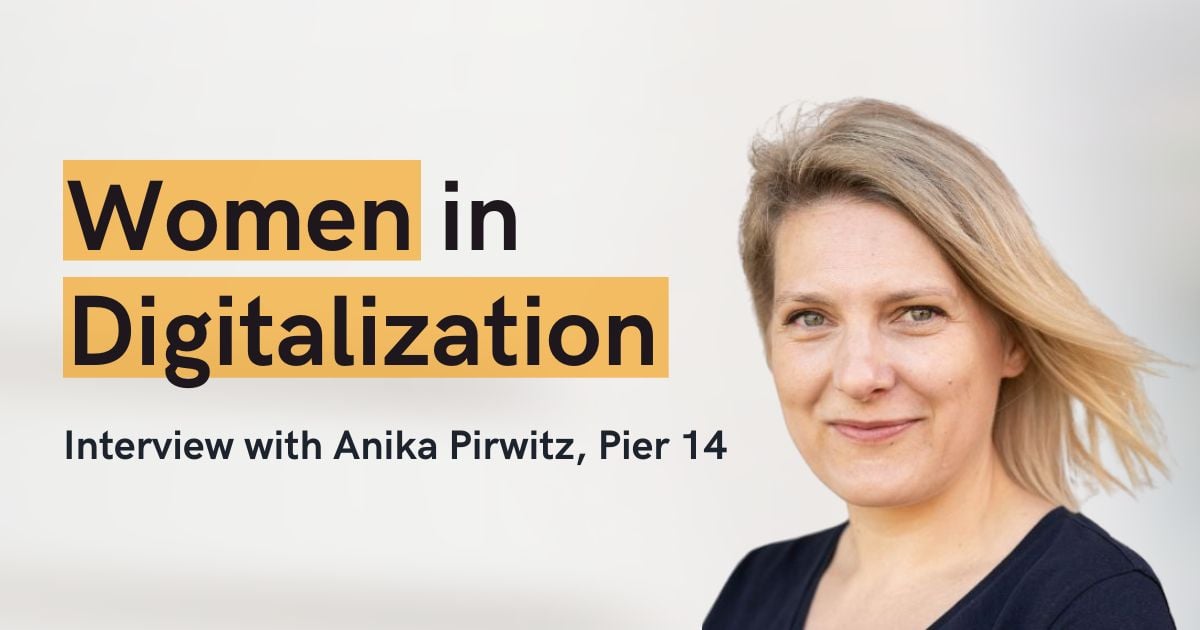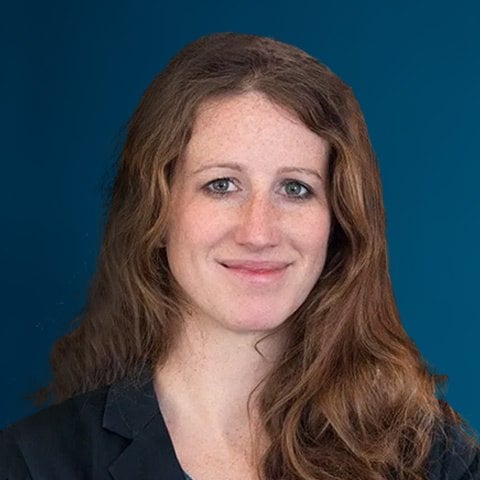E-Commerce | Customer Stories | Auto-Updating Copy | Automated Texts + Product Descriptions
Women in Digitalization: Interview with Anika Pirwitz of Pier 14
Reading Time 9 mins | January 30, 2023 | Written by: Heike Hoppmann

Digitalization is a big buzzword. But who are the players behind individual projects? What is really happening in companies in this regard? We turned to the pioneering women of digitization to find out more. Anika Pirwitz is e-commerce manager at Pier 14, a lifestyle and fashion company on the Baltic Sea. In this interview, she reveals why the challenges on the island of Usedom are different from those in the rest of Germany and how she is driving the automation of Pier 14's online store.
Anika, tell us about yourself: who are you and what do you do at Pier 14?
I am the only e-commerce manager at Pier 14. Pier 14 is a family business that has existed for over 30 years. We currently have 16 lifestyle stores on the island and in Kühlungsborn. On Usedom we have two very exciting locations, Zinnowitz and Heringsdorf, where we have many so-called concept stores. There we offer fashion and curated accessories in combination with restaurants. That means we consolidate all the beautiful things in life, from fashion to food.
Recently, we are in the process of transferring this Pier 14 lifestyle online. With our own webshop, which has now recently been launched and is still being continuously optimized. This is where AX Semantics comes into play, because we want to enrich everything with lots of suitable texts and make it fancy.
It sounds like you are very proud of your work environment and your employer - and that you really like your job.
Yes, it's just a great company. It's fun, we have great products. We get to do business in the most beautiful part of life. I mean, who doesn't like to buy something nice? Who doesn't like to go out to eat? Giving people great moments is something wonderful.
My mission is to transport these great moments to the web. One of our three managing directors, Stefan Richter, who is driving all the digitization processes at Pier 14, wanted the entire infrastructure to be right from the start and everything to run as fully automatically as possible.
Because it's hard to recruit employees here on the island. I think it's hard everywhere. Up here in the northeast, very close to Poland, people want to taste the sea and go on vacation. But most of them want to live somewhere else, and especially young people are leaving. Because of the employment situation, but also because it makes sense, we have placed great emphasis on full automation right from the start. This includes all processes. Goods come in, are inventoried, photographed, and then automatically uploaded to the web store along with the pictures. When something is sold, it has to come directly from the cash register. That makes it very time-consuming, but also very exciting.
You're about to digitalize an entire way of life. How exactly are you going to achieve that?
I think three aspects will become important. One is the world of images. We have a great photo studio where we automatically take pictures of our products. Product images are mandatory. The icing on the cake is that we support the images with campaign images. So we generally try to shoot our looks and outfits in great locations here on the island. That way we also capture special landmarks of Usedom. For example, the piers, which every visitor to Usedom knows. The vacation feeling comes back when you enter the online store, because the familiar images are reflected there.
Another aspect is that we carefully curate our fashion and shop by outfits. We give advice and don't just say, “Here's an alpaca sweater,” but we recommend what goes with it. That's what we want to bring to the web, with outfit ideas like “Looks of the Week”. That captures the attitude towards life we want to convey.
The third point is text - for our products and our website. For example, we don't want to only write about sweaters: “This one is extra warm and has a great material and is cozy in both summer and winter”. We want to say much more about the product, like: "Man, you can walk down the boardwalk in Heringsdorf with this alpaca sweater. It's just as good for strolling as it is for eating in one of our restaurants. Here, at the Baltic Sea, in Heringsdorf. Why don't you come and visit us?”
We developed the idea of designing the texts in this way together with Saim (note: CEO of AX Semantics). He put a lot of thought into developing very engaging texts from a very small amount of data. This is achieved by integrating this relaxed Baltic Sea feeling.
You use technology in a very advanced way. How do you compare Pier 14 to other companies in this regard?
We really are a big technological pioneer here on the island. What Pier 14 does is so well thought out and automated that I don't know of anyone else on the island that comes close. Whether it is the automated content creation or our photo studio, we are very proud.
It was an accolade when the Otto Group called us and said: “We heard you have a cool photo studio, can we take a look?” We couldn't believe that they knew about it and were looking at such small businesses like us. But I think it shows how advanced Pier 14 is in this area.
What are the reactions of those around you when you tell them what you are doing?
I come from a technical background. I used to be a project manager for online projects and that's what I know how to do. Then I moved to the island and I thought, “I'm probably never going to do digital again because there's nothing like that on the island.” Now I have this great opportunity to work at Pier 14. With Stefan and one or two other colleagues, I have a great team to exchange ideas with.
But outside of this group, it's very difficult to talk about my day-to-day work because I'm not a teacher, a baker, or a bus driver that everyone can easily understand. Whether it's family or friends, very few people understand what I do, and I often hear, “Oh, I also shop online sometimes”. Those are the reactions.
Would you describe yourself as a digital driver?
I've always had a passion for digital and I'm also a bit of a nerd. I'm happy when things work well, are easy to use and I'm excited about new technology. I am innately curious and want to understand everything. After so many years in the business, you realize that everything is constantly changing and evolving. It's fun and more and more is becoming possible – everything is getting easier, more exciting and faster.
This creates great opportunities, such as those offered by AX Semantics. It's a tool that makes everyday work a lot easier, and it's fun to get to grips with something like that. When I once watched a series of presentations on automation technology, the only thing I found exciting was AX Semantics. Everything else didn't fit us so well. We thought: Whoever can write texts for the Klingel catalog can also write our texts. That's when we decided on AX Semantics.
You yourself are more than open to new technologies. Did you have to do a lot of convincing with your colleagues for the digitalization projects?
Technology is going to make a lot of things easier, so we didn't have to do as much proselytizing. So it wasn't so much that cliché that you have to convince every colleague. I think it was the other way around, because not everyone was interested in the technical stuff.
But the trust in technology is relatively high. A lot of people think: You just have to press the magic button. And that content automation with Natural Language Generation (NLG) means, a little robot writes entire texts and you don't have to do anything. If I have to proselytize, it's more that technology doesn't work on its own.
What was your career aspiration as a child?
For a long time I had no idea what I wanted to do. But as a child I wanted to be a radio presenter and later a pharmacist. I ended up studying tourism management and had an epiphany when I created a website as part of my major. This involved all sorts of things: video, editing with a bit of programming, a bit of content management system, a bit of project management, tools, everything you need for that. Later, project management with technical understanding of different types of media. And that's when I thought, “This is totally fun!” With my first work experience, I knew that digital work was my thing.
With the advanced topics you're tackling and the experience you've already gained, you surely have a tip or two to share with other female digital drivers?
Yes, my advice to young women is: Of course you can do and create anything. But you have to be curious and not give up easily. You have to think a lot about it, acquire knowledge. Don't get discouraged by the technology jungle, just get started. See what technical solutions can do and then learn the ropes. I believe that if you have perseverance, you can do anything.
Dear Anika, those were beautiful words - thank you very much for the interview.
Heike Hoppmann
Heike Hoppmann believes in the power of words. The use of words can be creative, but above all it must be purposeful. Writing is not an end in itself. As a mentor and coach for editorial management and digital transformation processes, she has successfully conveyed this idea to many online editors. And today it is the guiding principle of her work as PR Manager at AX Semantics GmbH.

